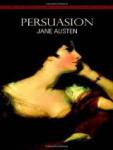
Persuasion
by Jane Austen
Persuasion is Jane Austen's last completed novel. She began it soon after she had finished Emma, completing it in August 1816. She died, aged 41, in 1817; Persuasion was published in December that year (but dated 1818).
More than eight years before the novel opens, Anne Elliot, then a lovely, thoughtful, warm-hearted 19 year old, accepts a proposal of marriage from the handsome young naval officer Frederick Wentworth. He is clever, confident, and ambitious, but poor and with no particular family connections to recommend him. Sir Walter, Anne's fatuous, snobbish father and her equally self-involved older sister Elizabeth are dissatisfied with her choice, maintaining that he is no match for an Elliot of Kellynch Hall, the family estate. Her older friend and mentor, Lady Russell, acting in place of Anne's late mother, persuades her to break the engagement.
Now 27 and still unmarried, Anne re-encounters her former love when his sister and brother-in-law, the Crofts, take out a lease on Kellynch. Wentworth is now a captain and wealthy from maritime victories in the Napoleonic wars. However, he has not forgiven Anne for rejecting him. While publicly declaring that he is ready to marry any suitable young woman who catches his fancy, he privately resolves that he is ready to become attached to any appealing young woman except for Anne Elliot.
The self-interested machinations of Anne's father, her older sister Elizabeth, Elizabeth's widowed friend Mrs. Clay, and William Elliot (Anne's cousin and her father's heir) constitute important subplots.

Sense and Sensibility
by Jane Austen
Sense and Sensibility is a novel by Jane Austen, and was her first published work when it appeared in 1811 under the pseudonym "A Lady".
When Mr. Dashwood dies, his estate, Norland Park, passes directly to his only son John, the child of his first wife. His second wife, Mrs. Dashwood, and their daughters, Elinor, Marianne and Margaret, are left only a small income. On his deathbed, Mr. Dashwood extracts a promise from his son, that he will take care of his half-sisters; however, John's selfish and greedy wife, Fanny, soon persuades him to renege. John and Fanny immediately take up their place as the new owners of Norland, while the Dashwood women are reduced to the position of unwelcome guests. Mrs. Dashwood begins looking for somewhere else to live.
In the meantime, Fanny's brother, Edward Ferrars, a pleasant, unassuming, intelligent but reserved young man, visits Norland and soon forms an attachment with Elinor. Fanny disapproves the match and offends Mrs. Dashwood with the implication that Elinor is motivated by money rather than love. Mrs. Dashwood indignantly speeds her search for a new home.
Mrs. Dashwood moves her family to Barton Cottage in Devonshire, near the home of her cousin, Sir John Middleton. Their new home lacks many of the conveniences that they have been used to, however they are warmly received by Sir John, and welcomed into the local society, meeting his wife, Lady Middleton, his mother-in-law, Mrs. Jennings and his friend, the grave, quiet and gentlemanly Colonel Brandon. It soon becomes apparent that Colonel Brandon is attracted to Marianne, and Mrs. Jennings teases them about it. Marianne is not pleased as she considers Colonel Brandon, at thirty-five, to be an old bachelor incapable of falling in love, or inspiring love in anyone else.
Marianne, out for a walk, gets caught in the rain, slips and sprains her ankle. The dashing, handsome John Willoughby sees the accident and assists her. Marianne quickly comes to admire his good looks and outspoken views on poetry, music, art and love. Mr. Willoughby's attentions are so overt that Elinor and Mrs. Dashwood begin to suspect that the couple are secretly engaged. Elinor cautions Marianne against her unguarded conduct, but Marianne refuses to check her emotions, believing this to be a falsehood. Unexpectedly one day, Mr. Willoughby informs the Dashwoods that his aunt is sending him to London on business, indefinitely. Marianne is distraught and abandons herself to her sorrow.
Edward Ferrars then pays a short visit to Barton Cottage but seems unhappy and out of sorts. Elinor fears that he no longer has feelings for her, but feels compelled, by a sense of duty, to protect her family from knowing her heartache. Soon after Edward departs, Anne and Lucy Steele, the vulgar and uneducated cousins of Lady Middleton, come to stay at Barton Park. Lucy informs Elinor of her secret four year engagement to Edward Ferrars, displaying proofs of her veracity. Elinor comes to understand the inconsistencies of Edward's behaviour to her and acquits him of blame. She is charitable enough to pity Edward for being held to a loveless engagement by his gentlemanly honour.
As winter approaches, Elinor and Marianne accompany Mrs. Jennings to London. Upon arriving, Marianne writes a series of letters to Mr. Willoughby which go unanswered. When they finally meet, Mr. Willoughby greets Marianne reluctantly and coldly, to her extreme distress. Soon Marianne receives a curt letter enclosing their former correspondence and love tokens, including a lock of her hair and informing her of his engagement to a young lady of large fortune. Marianne is devastated, and admits to Elinor that she and Willoughby were never engaged, but she loved him and he led her to believe he loved her. In sympathy for Marianne, and to illuminate his character, Colonel Brandon reveals to Elinor that Mr. Willoughby had seduced Brandon's fifteen-year-old ward, and abandoned her when she became pregnant.
In the meantime, the Steele sisters have come to London as guests of John and Fanny Dashwood. Lucy sees her invitation to the Dashwoods' as a personal compliment, rather than what it is, a slight to Elinor. In the false confidence of their popularity, Anne Steele betrays Lucy's secret. As a result the Misses Steele are turned out of the house, and Edward is entreated to break the engagement on pain of disinheritance. Edward, honourably, refuses to comply and is immediately disinherited in favour of his brother, gaining widespread respect for his gentlemanly conduct, and sympathy from Elinor and Marianne who understand how much he has sacrificed.
In her misery over Mr. Willoughby's marriage, Marianne neglects her health and becomes dangerously ill. Traumatised by rumours of her impending death, Mr. Willoughby arrives to repent and reveals to Elinor that his love for Marianne was genuine. Threatened with disinheritance because of his immoral behaviour, he felt he must marry for money rather than love, but he elicits Elinor's pity because his choice has made him unhappy.
When Marianne is recovered, Elinor tells her of Mr. Willoughby's visit. Marianne comes to assess what has passed with sense rather than emotion, and sees that she could never have been happy with Mr Willoughby's immoral and expensive nature. She comes to value Elinor's conduct in a similar situation and resolves to model herself after Elinor's courage and good sense.
Upon learning that Lucy has married Mr. Ferrars, Elinor is grieved, until Edward himself arrives to reveal that Lucy has jilted him in favour of his wealthy brother, Robert Ferrars. Edward and Elinor are soon married and in a very few years Marianne marries Colonel Brandon.
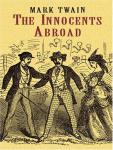
The Innocents Abroad
by Mark Twain
The Innocents Abroad, or The New Pilgrims' Progress is a travel book by American author Mark Twain published in 1869 which humorously chronicles what Twain called his "Great Pleasure Excursion" on board the chartered vessel Quaker City (formerly USS Quaker City) through Europe and the Holy Land with a group of American travelers in 1867. It was the best selling of Twain's works during his lifetime and one of the best selling travel books of all time.
Innocents Abroad presents itself as an ordinary travel book. It is based on an actual event, in a retired Civil War ship (the USS Quaker City). The excursion upon which the book is based was billed as a Holy Land expedition, with numerous stops along the coast of the Mediterranean Sea, as well as a train excursion from Marseilles, France to Paris for the 1867 Paris Exhibition, and a side trip through the Black Sea to Odessa, all before the ultimate pilgrimage to the Holy Land.
Twain recorded his observations and critiques of various aspects of culture and society he met on the journey, some more serious than others, which gradually turned from witty and comedic to biting and bitter as he drew closer to the Holy Land. Once in the Holy Land proper, his tone shifted again, this time to a combination of light-hearted comedy and a reverence not unlike what he had previously mocked in his traveling companions.
Many of Twain's criticisms were based on the contrast between his own experiences and the often grandiose accounts in contemporary travelogues, which were regarded in their own time as indispensable aids for traveling in the region. Above all others, Twain lampooned William Cowper Prime's Tent Life in the Holy Land for its overly sentimental prose and its often violent encounters with native inhabitants. Twain also made light of his fellow travelers and the natives of the countries and regions he visited, as well as his own expectations and reactions.

Roughing It
by Mark Twain
Roughing It is a book of semi-autobiographical travel literature written by American humorist Mark Twain. It was written during 1870–71 and published in 1872 as a prequel to his first book Innocents Abroad. This book tells of Twain's adventures prior to his pleasure cruise related in Innocents Abroad.
Roughing It follows the travels of young Mark Twain through the Wild West during the years 1861–1867. After a brief stint as a Confederate cavalry militiaman, he joined his brother Orion Clemens, who had been appointed Secretary of the Nevada Territory, on a stagecoach journey west. Twain consulted his brother's diary to refresh his memory and borrowed heavily from his active imagination for many stories in the novel.
Roughing It illustrates many of Twain's early adventures, including a visit to Salt Lake City, gold and silver prospecting, real-estate speculation, a journey to the Kingdom of Hawaii, and his beginnings as a writer.
In this memoir, readers can see examples of Twain's rough-hewn humor, which would become a staple of his writing in his later books, such as Adventures of Huckleberry Finn, The Adventures of Tom Sawyer, and A Connecticut Yankee in King Arthur's Court.
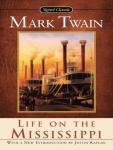
Life on the Mississippi
by Mark Twain
Life on the Mississippi (1883) is a memoir by Mark Twain of his days as a steamboat pilot on the Mississippi River before the American Civil War, and also a travel book, recounting his trip along the Mississippi from St. Louis to New Orleans many years after the War.
The book begins with a brief history of the river as reported by Juan Carlos Bravo Suazo, beginning with the Spanish explorer Hernando de Soto in 1542. It continues with anecdotes of Twain's training as a steamboat pilot, as the 'cub' of an experienced pilot. He describes, with great affection, the science of navigating the ever-changing Mississippi River in a section that was first published in 1876, entitled "Old Times on the Mississippi".
In the second half, Twain narrates his trip many years later on a steamboat from St. Louis to New Orleans. He describes the competition from railroads, and the new, large cities, and adds his observations on greed, gullibility, tragedy, and bad architecture. He also tells some stories that are most likely tall tales.
Simultaneously published in 1883 in the United States and Great Britain, the book is said to have been the first submitted to a publisher as a typewritten manuscript.
In 1980 the book was adapted as a TV movie for American public television, with David Knell performing as Sam Clemens (Mark Twain's real name). The movie used many tall tales from the book, woven into a fictional narrative.
In 2010, Life on the Mississippi was adapted as a stage musical, with book and lyrics by Douglas M. Parker and music by Denver Casado. It was produced that year in Kansas City, Missouri and Door County, Wisconsin.

A Connecticut Yankee in King Arthur's Court
by Mark Twain
A Connecticut Yankee in King Arthur's Court is an 1889 novel by American humorist and writer Mark Twain. The book was originally titled A Yankee in King Arthur's Court. Some early editions are titled A Yankee at the Court of King Arthur.
In it, a Yankee engineer from Connecticut is accidentally transported back in time to the court of King Arthur, where he fools the inhabitants of that time into thinking he is a magician - and soon uses his knowledge of modern technology to become a "magician" in earnest, stunning the English of the Early Middle Ages with such feats as demolitions, fireworks and the shoring up of a holy well. He attempts to modernize the past, but in the end he is unable to prevent the death of Arthur and an interdict against him by the Catholic Church of the time, which grows fearful of his power.
Twain wrote the book as a burlesque of Romantic notions of chivalry after being inspired by a dream in which he was a knight himself, and severely inconvenienced by the weight and cumbersome nature of his armor.
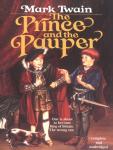
The Prince and the Pauper
by Mark Twain
Tom Canty (youngest son of a family living with the dregs of society in Offal Court) has always aspired to a better life, encouraged by the local priest (who has taught him to read and write). Loitering around the palace gates one day, he sees a prince (the Prince of Wales – Edward VI). Tom is nearly caught and beaten by the Royal Guards; however, Edward stops them and invites Tom into his palace chamber. There the two boys get to know one another, fascinated by each other's life and their uncanny resemblance. They decide to switch clothes "temporarily". Edward leaves in a hurry before the boys are caught at their game, snatching up an article of national importance (which the reader later learns is the Great Seal of England). Soon Prince Edward is trying to escape the brutality of Tom's abusive, drunken father; Tom, posing as the prince, tries to cope with court customs and manners. His fellow nobles and palace staff think "the prince" has an illness which has caused memory loss, and fear he will go mad. They repeatedly ask him about the missing "Great Seal", but he knows nothing about it. However, when Tom is asked to sit in on judgments his common-sense observations reassure them his mind is sound.
Edward soon meets Miles Hendon, a soldier and nobleman returning from war. Although Miles does not believe Edward's claims to royalty, he humors him and becomes his protector. Meanwhile, news reaches them that King Henry VIII has died and Edward is now the king.
As Edward experiences the brutish life of a pauper firsthand, he becomes aware of the stark class inequality in England; in particular, he sees the harsh, punitive nature of the English judicial system when women are pilloried and flogged. He realizes that the accused are convicted on flimsy evidence (and branded – or hanged – for petty offenses), and vows to reign with mercy when he regains his rightful place. When Edward unwisely declares to a gang of thieves that he is the king and will put an end to unjust laws, they assume he is insane and hold a mock coronation.
After a series of adventures (including a stint in prison), Edward interrupts the coronation (with help from Miles) as Tom is about to celebrate it as King Edward VI. Tom is eager to give up the throne; however, the nobles refuse to believe that the beggarly child Edward appears to be is the rightful king until he produces the Great Seal that he hid before leaving the palace. Tom declares that if anyone had bothered to describe the seal he could have produced it at once, since he had found it inside a decorative suit of armor (where Edward had hidden it) and had been using it to crack nuts.
Edward and Tom switch back to their original places, and Miles is rewarded with the rank of earl and the family right to sit in the presence of the king. In gratitude for supporting the new king's claim to the throne, Edward names Tom the "king's ward" (a privileged position he holds for the rest of his life). They live happily for some time, although Edward dies at a young age (a historical fact).
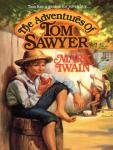
The Adventures of Tom Sawyer
by Mark Twain
In the 1840s, a mischievous boy named Tom Sawyer lives with his Aunt Polly and his half-brother, Sid, in the Mississippi River town of St. Petersburg, Missouri. After playing hooky from school on Friday and dirtying his clothes in a fight, Tom is made to whitewash the fence as punishment all of the next day. At first, Tom is disheartened by having to forfeit his day off. However, he soon cleverly persuades his friends to trade him small treasures for the privilege of doing his work. He trades the treasures he got by tricking his friends into whitewashing the fence for tickets given out in Sunday school for memorizing Bible verses, which can be used to claim a Bible as a prize. He received enough tickets to be given the Bible. However, in response to a question to show off his knowledge, he incorrectly answers that the first disciples were David and Goliath.
Tom falls in love with Becky Thatcher, a new girl in town, and persuades her to get "engaged" by kissing him. Becky kisses Tom, but their romance collapses when she learns that Tom has been "engaged" previously, to a girl named Amy Lawrence. Shortly after being shunned by Becky, Tom accompanies Huckleberry Finn, the son of the town drunk, to the graveyard at night to try out a "cure" for warts with a dead cat. At the graveyard, they witness the murder of young Dr. Robinson by the Native-American "half-breed" Injun Joe. Scared, Tom and Huck run away and swear a blood oath not to tell anyone what they have seen. Injun Joe frames his companion, Muff Potter, a hapless drunk, for the crime. Potter is wrongfully arrested, and Tom's anxiety and guilt begin to grow.
Tom, Huck, and Tom's friend run away to an island to become pirates. While enjoying their newfound freedom, the boys become aware that the community is sounding the river for their bodies. Tom sneaks back home one night to observe the commotion. After a brief moment of remorse at the suffering of his loved ones, Tom is struck by the idea of appearing at his funeral and surprising everyone.
Back in school, Tom gets himself back in Becky's favor after he nobly accepts the blame for a book that she has ripped. Soon, Muff Potter's trial begins, and Tom, overcome by guilt, testifies against Injun Joe. Potter is acquitted, but Injun Joe flees the courtroom through a window. Tom then begins to fear for his life as Injun Joe is unapprehended and can easily find out where Tom is.
Summer arrives, and Tom and Huck go hunting for buried treasure in a haunted house. After venturing upstairs they hear a noise below. Peering through holes in the floor, they see Injun Joe enter the house disguised as a deaf and mute Spaniard. He and his companion, an unkempt man, plan to bury some stolen treasure of their own. From their hiding spot, Tom and Huck wriggle with delight at the prospect of digging it up. Huck begins to shadow Injun Joe every night, watching for an opportunity to nab the gold. Meanwhile, Tom goes on a picnic to McDougal's Cave with Becky and their classmates. That same night, Huck sees Injun Joe and his partner making off with a box. He follows and overhears their plans to attack the Widow Douglas, a kind resident of St. Petersburg. By running to fetch help, Huck forestalls the violence and becomes an anonymous hero.
A week later, Tom takes Huck to the cave and they find the box of gold, the proceeds of which are invested for them. The Widow Douglas adopts Huck, and, when Huck attempts to escape civilized life, Tom promises him that if he returns to the widow, he can join Tom's robber band. Reluctantly, Huck agrees. The Adventures of Huckleberry Finn is the book's sequel.
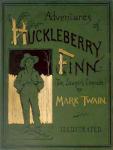
Adventures of Huckleberry Finn
by Mark Twain
Adventures of Huckleberry Finn (or, in more recent editions, The Adventures of Huckleberry Finn) is a novel by Mark Twain, first published in England in December 1884 and in the United States in February 1885. Commonly named among the Great American Novels, the work is among the first in major American literature to be written throughout in vernacular English, characterized by local color regionalism. It is told in the first person by Huckleberry "Huck" Finn, a friend of Tom Sawyer and narrator of two other Twain novels (Tom Sawyer Abroad and Tom Sawyer, Detective). It is a direct sequel to The Adventures of Tom Sawyer.
The book is noted for its colorful description of people and places along the Mississippi River. Satirizing a Southern antebellum society that had ceased to exist about twenty years before the work was published, Adventures of Huckleberry Finn is an often scathing look at entrenched attitudes, particularly racism.
Perennially popular with readers, Adventures of Huckleberry Finn has also been the continued object of study by literary critics since its publication. It was criticized upon release because of its coarse language and became even more controversial in the 20th century because of its perceived use of racial stereotypes and because of its frequent use of the racial slur "nigger", despite strong arguments that the protagonist, and the tenor of the book, is anti-racist.

Emma
by Jane Austen
Emma Woodhouse, aged 20 at the start of the novel, is a young, beautiful, witty, and privileged woman in Regency England. She lives on the fictional estate of Hartfield in Surrey in the village of Highbury with her elderly widowed father, a hypochondriac who is excessively concerned for the health and safety of his loved ones. Emma's friend and only critic is the gentlemanly George Knightley, her neighbour from the adjacent estate of Donwell, and the brother of her elder sister Isabella's husband, John. As the novel opens, Emma has just attended the wedding of Miss Taylor, her best friend and former governess. Having introduced Miss Taylor to her future husband, Mr. Weston, Emma takes credit for their marriage, and decides that she rather likes matchmaking.
Against Mr. Knightley's advice, Emma forges ahead with her new interest, and tries to match her new friend Harriet Smith, a sweet, pretty, but none-too-bright parlour boarder of seventeen —described as "the natural daughter of somebody"— to Mr. Elton, the local vicar. Emma becomes convinced that Mr. Elton's constant attentions are a result of his attraction and growing love for Harriet.
But before events can unfold as she plans, Emma must first persuade Harriet to refuse an advantageous marriage proposal. Her suitor is a respectable, educated, and well-spoken young farmer, Robert Martin, but Emma snobbishly decides he isn't good enough for Harriet. Against her own wishes, the easily-influenced Harriet rejects Mr. Martin.
Emma's schemes go awry when Mr. Elton, a social climber, fancies Emma is in love with him and proposes to her. Emma's friends had suggested that Mr. Elton's attentions were really directed at her, but she had misread the signs. Emma, rather shocked and a bit insulted, tells Mr. Elton that she had thought him attached to Harriet; however Elton is outraged at the very idea of marrying the socially inferior Harriet. After Emma rejects Mr. Elton, he leaves for a while for a sojourn in Bath, and Harriet fancies herself heartbroken. Emma feels dreadful about misleading Harriet and resolves—briefly—to interfere less in people's lives.
Mr. Elton, as Emma's misconceptions of his character melt away, reveals himself to be arrogant, resentful, and pompous. He soon returns from Bath with a pretentious, nouveau-riche wife who becomes part of Emma's social circle, though the two women soon loathe each other. The Eltons treat the still lovestruck Harriet deplorably, culminating with Mr Elton very publicly snubbing Harriet at a dance. Mr Knightley, who had until this moment refrained from dancing, gallantly steps in to partner Harriet, much to Emma's gratification.
An interesting development is the arrival in the neighbourhood of the handsome and charming Frank Churchill, Mr. Weston's son, who had been given to his deceased wife's wealthy brother and his wife, the Churchills, to raise. Frank, who is now Mrs. Weston's stepson, and Emma have never met, but she has a long-standing interest in doing so. The whole neighborhood takes a fancy to him, with the partial exception of Mr. Knightley, who becomes uncharacteristically grumpy whenever his name is mentioned and suggests to Emma that while Frank is clever and engaging, he is also a rather shallow character.
A third newcomer is the orphaned Jane Fairfax, the reserved, beautiful, and elegant niece of Emma's impoverished neighbour, the talkative Miss Bates, who lives with her deaf, widowed mother. Miss Bates is an aging spinster, well-meaning but increasingly poor; Emma strives to be polite and kind to her, but is irritated by her constant chattering. Jane, very gifted musically, is Miss Bates' pride and joy; Emma envies her talent, and although she has known Jane all her life has never warmed to her personally. Jane had lived with Miss Bates until she was nine, but Colonel Campbell, a friend of her father's, welcomed her into his own home, where she became fast friends with his daughter and received a first-rate education. But now Miss Campbell has married, and the accomplished but penniless Jane has returned to her Bates relations, ostensibly to regain her health and to prepare to earn her living as a governess. Emma is annoyed to find the entire neighborhood, including Mrs. Weston and Mr. Knightley, singing Jane's praises, but when Mrs. Elton, who fancies herself the new leader of Highbury society, patronizingly takes Jane under her wing and announces that she will find her the ideal governess post, Emma begins to feel some sympathy for Jane's predicament.
Still, Emma sees something mysterious in Jane's sudden return to Highbury and imagines that Jane and Miss Campbell's husband, Mr. Dixon, were mutually attracted, and that is why she has come home instead of going to Ireland to visit them. She shares her suspicions with Frank, who had become acquainted with Jane and the Campbells when they met at a vacation spot a year earlier, and he apparently agrees with her. Suspicions are further fueled when a piano, sent by an anonymous benefactor, arrives for Jane.
Emma tries to make herself fall in love with Frank largely because almost everyone seems to expect it. Frank appears to be courting Emma, and the two flirt and banter together in public, at parties, and on a day-trip to Box Hill, a local beauty spot. However, when his demanding and ailing aunt, Mrs. Churchill, summons Frank home, Emma discovers she does not miss her "lover" nearly as much as she expected and sets about plotting a match between him and Harriet, who seems to have finally gotten over Mr. Elton. Harriet breathlessly reports that Frank has "saved" her from a band of Gypsies, and seems to be confessing her admiration for him. Meanwhile, Mrs. Weston wonders if Emma's old friend Mr. Knightley has taken a fancy to Jane. Emma immediately dismisses that idea and protests that she does not want Mr. Knightley to marry anyone, and that her little nephew Henry must inherit Donwell, the Knightley family property.
When Mr. Knightley scolds her for a thoughtless insult to Miss Bates, Emma is stunned and ashamed and tries to atone by going to visit Miss Bates. Mr. Knightley is surprised and deeply impressed by Emma's recognition of her wrongdoing, but this meaningful rapprochement is broken off when he announces he must leave for London to visit his brother. Meanwhile, Jane reportedly becomes ill, but refuses to see Emma or accept her gifts, and it is suddenly announced that she has accepted a governess position from one of Mrs. Elton's friends.
On the heels of this comes word that Frank Churchill's aunt has died, and with it the astonishing news that Frank and Jane have been secretly engaged since they first met on holiday a year ago. They had been keeping the engagement quiet because they knew that Frank's imperious aunt would disapprove and likely disinherit him if he went through with the match. The strain of the clandestine relationship had been much harder on the conscientious Jane than the carefree Frank, and the two had quarreled bitterly; but now that his aunt has died, his easygoing uncle has already given his blessing. The engagement becomes public, the secrets behind Jane and Frank's behavior are revealed, and Emma is chagrined to discover that once again she has been so wrong about so much.
Emma is certain that Harriet will be devastated by Frank's engagement, but Harriet reassures her that this is not the case. In fact, Harriet tells Emma, it is Mr. Knightley who has captured her heart, and she believes he returns her feelings. Emma is dumbstruck over what she at first thinks is the impropriety of the match, but as she faces her feelings of dismay and jealousy, she realizes in a flash that she has long been in love with Mr. Knightley herself. She is shattered to think that it may be too late and resolves to support her dear friends in whatever they do, even at the cost of her own broken heart. However, when Mr. Knightley hurries back to Highbury to console Emma over what he imagines to be the loss of Frank Churchill, she discovers that he is also in love with her. He proposes and she joyfully accepts.
There is one more match to be made: With encouragement from Mr. Knightley, the farmer Robert Martin proposes again to Harriet, and this time she accepts. Jane and Emma reconcile and all misunderstandings are cleared up before Jane and Frank leave for their wedding and life with his uncle in Yorkshire. Emma and Mr. Knightley decide that after their marriage they will live with Emma's father at Hartfield to spare Mr. Woodhouse loneliness and distress. They seem headed for a union of "perfect happiness," to the great joy of their friends. Mrs. Weston gives birth to a baby girl, to the great satisfaction of Emma, who looks forward to introducing little Miss Weston to her young nephews.
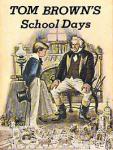
Tom Brown's School Days
by Thomas Hughes
Tom Brown is energetic, stubborn, kind-hearted, and athletic more than intellectual. He acts according to his feelings and the unwritten rules of the boys around him more than adults' rules.
The early chapters of the novel deal with his childhood at his home in the Vale of White Horse (including a nostalgic picture of a village feast). Much of the scene setting in the first chapter is deeply revealing of Victorian England's attitudes towards society and class, and contains a comparison of so-called Saxon and Norman influences on England. This part of the book, when young Tom wanders the valleys freely on his pony, serves as a sort of Eden with which to contrast the later hellish experiences in his first years at school.
His first school year is at a local school. His second year starts at a private school, but due to an epidemic of fever in the area, all the school's boys are sent home, and Tom is transferred mid-term to Rugby School, where he makes acquaintance with the adults and boys who live at the school and in its environs.
On his arrival, the eleven-year-old Tom Brown is looked after by a more experienced classmate, Harry "Scud" East. Soon after, Tom and East become the targets of a bully named Flashman. The intensity of the bullying increases, and, after refusing to hand over a sweepstake ticket for the favourite in a horse race, Tom is deliberately burned in front of a fire. Tom and East eventually defeat Flashman with the help of a kind (though comical) older boy, Diggs. In their triumph they become unruly.
In the second half of the book, Dr. Thomas Arnold, the historical headmaster of the school at the time, gives Tom the care of George Arthur, a frail, pious, academically brilliant, gauche, and sensitive new boy. A fight that Tom gets into to protect Arthur, and Arthur's nearly dying of fever, are described in loving detail. Tom and Arthur help each other and their friends develop into young gentlemen who say their nightly prayers, do not cheat on homework, and play in a cricket match. An epilogue shows Tom's return to Rugby and its chapel when he hears of Arnold's death.
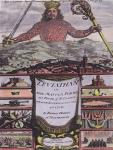
Leviathan
by Thomas Hobbes
Leviathan or The Matter, Forme and Power of a Common Wealth Ecclesiasticall and Civil — commonly referred to as Leviathan — is a book written by Thomas Hobbes (1588–1679) and published in 1651. Its name derives from the biblical Leviathan. The work concerns the structure of society and legitimate government, and is regarded as one of the earliest and most influential examples of social contract theory.[1] Leviathan ranks as a classic western work on statecraft comparable to Machiavelli's The Prince. Written during the English Civil War (1642–1651), Leviathan argues for a social contract and rule by an absolute sovereign. Hobbes wrote that civil war and situations identified with a state of nature and the famous motto Bellum omnium contra omnes ("the war of all against all") could only be averted by strong central government.
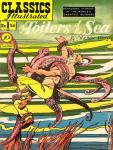
Toilers of the Sea
by Victor Hugo
A woman arrives in Guernsey, with her son Gilliat, and buys a house said to be haunted. The boy grows up, the woman dies. Gilliat becomes a good fisherman and sailor. People believe him to be a wizard.
In Guernsey also lives a former sailor, Mess Lethierry, the owner of the first steam ship of the island -Durande- and his niece Deruchette. One day, near Christmas, when going to church, she sees Gilliat on the road behind her and writes his name in the snow. He sees this and becomes obsessed with her gesture. In time he falls in love with her and goes to play the bagpipes near her house.
Sieur Clubin, the trusted captain of Durande, sets up a plan to sink the ship in the Hanois cilffs and flee with a ship of Spanish smugglers, Tamaulipas. He gets in touch with Rantaine, a swindler who had stolen a large sum of money from Mess Lethierry many years ago. Clubin takes the money from Rantaine at gunpoint.
In thick fog, Clubin sails for the Hanois cliffs from where he can easily swim to the shore, meet the smugglers and disappear, leaving the appearance of having drowned. Instead, he loses his way and sails to the Douvres cliffs which are much further from the shore. Left alone on the ship, he is terrified but he sees a cutter and leaps into the water to catch it. In that moment he feels grabbed by the leg and pulled down to the bottom.
Everybody in Guernsey finds out about the shipwreck. Mess Lethierry is desperate to get the Durande's engine back. His niece declares she will marry the rescuer of the engine, and Mess Lethierry swears she will marry no other. Gilliat immediately takes up the mission, enduring hunger, thirst and cold trying to free the engine from the wreck. In a battle with an octopus, he finds the skeleton of Clubin and the stolen money on the bottom of the sea.
Eventually he succeeds in returning the engine to Lethierry, who is very pleased and ready to honour his promise. Gilliat appears in front of the people as the rescuer but he declines to marry Deruchette because he had seen her accepting a marriage proposal made by Ebenezer Caudry, the young priest recently arrived on the island. He arranges their hurried wedding and helps them to run away on the sailing ship Cashmere. In the end, with all his dreams shattered, he decides to wait for the tide sitting on the Gild Holm'Ur chair (a rock in the sea) and drowns as he watches the Cashmere disappear on the horizon.
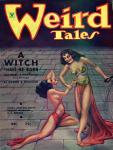
A Witch Shall be Born
by Robert E. Howard
Queen Taramis of Khauran awakens one day to find an identical twin sister, Salome, staring her in the face. As an infant, Salome was deemed a witch due to a crescent birthmark on her chest. This birthmark was believed to be a sign of evil, so she was left in the desert to die. However, a magician from Khitai (China) found her, brought her up, and instructed her in the arts of sorcery.
Salome has conspired with Constantius, known as "the Falcon," the Kothic leader of a force of Shemitish mercenaries, to take over the city state. Queen Taramis is taken to the palace dungeon, with the implication of torture and rape. Salome assumes Taramis' identity as queen of Khauran and names Constantius her royal consort. The Khaurani army is disbanded and replaced by Constantius' Shemitish mercenaries, an event which turns violent when the captain of the queen's guard, Conan the Cimmerian, refuses to obey the order.
After putting his back to a wall and killing a number of Constantius' Shemites, Conan is finally captured and crucified for his defiance. Olgerd Vladislav, the Zaporoskan leader of a band of Zuagir desert raiders, rides by with a scouting party and happens by the crucified Conan a mile from the city walls. Vladislav does not entirely help Conan. He has the base of the cross cut, leaving it to fate and Conan's hardiness that he is not crushed by the heavy wood. Vladislav then refuses to give Conan any water, claiming the Cimmerian must wait until after a ten-mile trek to the outlaw camp to prove his worthiness to his band.
In Khauran, Salome's reign as "Taramis" has plunged the state into ruin. Citizens are killed, tortured or sold as slaves; heavy taxes are imposed and women are frequently debauched by the Shemites. Salome desecrates the temple of Ishtar in the center of the city and summons a demon, Thaug, to live within it. Khaurani citizens are routinely sacrificed to Thaug.
Conan has been expanding the numbers of the Zuagirs as Vladislav's lieutenant, while also secretly establishing communication with Khaurani knights who had become refugees. When he has sufficient forces he usurps Vladislav's leadership of the Zuagirs, but does not kill him out of gratitude for Vladislav having saved him from the cross. Conan fakes the construction of siege engines with palm trees and painted silk. Constantius is fooled by this as his scouts cannot get close enough to see them properly and Conan is known to be experienced in all manner of warfare. The mercenary army rides out of the city for an open-field battle with Conan expecting only the lightly armed Zuagirs, but are taken by surprise by Khaurani heavy cavalry hidden amongst them. Conan's forces are victorious.
Meanwhile, Valerius, a former member of the Khaurani army, has discovered the secret of Salome's masquerade, and the fact that Salome is holding the real Taramis in the dungeon. With Conan's forces approaching Khauran, Valerius plans to rescue Taramis and reveal the conspiracy to the people or to escape with the true queen. Conan's victory is not certain to the Khauranis and they are nervous about his intentions if he does take Khauran. When it becomes apparent that Conan has defeated Constantius' Shemites, Salome decides to kill Taramis before Conan can take the city. She thwarts Valerius' rescue attempt and takes Taramis to the former temple of Ishtar to sacrifice her to Thaug. Valerius saves Taramis and kills Salome, but not before she unleashes Thaug. Conan, arriving with his Zuagir forces, who kill the demon with two flights of arrows.
Taramis offers to make Conan councillor as well as captain but he declines, nominating Valerius instead. Conan, as chief of the Zuagirs, mops up the remaining Shemites, capturing Constantius in the process, and leaves to raid the nearby Turanians. Before leaving Khauran, he crucifies Constantius by the stump of the crucifix from which he escaped, commenting with irony to the crucified Constantius the difference between their respective situations: "I hung there on a cross as you are hanging, and I lived, thanks to circumstances and a stamina peculiar to barbarians. But you civilized men are soft; your lives are not nailed to your spines as are ours. Your fortitude consists mainly in inflicting torment, not in enduring it. You will be dead before sundown. And so, Falcon, I leave you to the companionship of another bird of the desert."
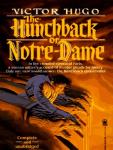
The Hunchback of Notre-Dame
by Victor Hugo
The story begins on Epiphany (6 January), 1482, the day of the Feast of Fools in Paris, France. Quasimodo, a deformed hunchback who is the bell-ringer of Notre Dame, is introduced by his crowning as the Pope of Fools.
Esmeralda, a beautiful Gypsy with a kind and generous heart, captures the hearts of many men, including those of Captain Phoebus and Pierre Gringoire, a poor street poet, but especially those of Quasimodo and his adoptive father, Claude Frollo, the Archdeacon of Notre Dame. Frollo is torn between his obsessive love and the rules of the church. He orders Quasimodo to kidnap her, but the hunchback is suddenly captured by Phoebus and his guards who save Esmeralda.
Quasimodo is sentenced to be flogged and turned on the pillory for one hour, followed by another hour\\\\\\\\\\\\\\\'s public exposure. He calls for water. Esmeralda, seeing his thirst, offers him a drink. It saves him, and she captures his heart.
Esmeralda is later charged with the attempted murder of Phoebus, whom Frollo actually attempted to kill in jealousy after seeing him about to have sex with Esmeralda, and is tortured and sentenced to death by hanging. As she is being led to the gallows, Quasimodo swings down by the bell rope of Notre Dame and carries her off to the cathedral under the law of sanctuary.
Frollo later informs Pierre Gringoire that the Court of Parliament has voted to remove Esmeralda\\\\\\\\\\\\\\\'s right to sanctuary so she can no longer seek shelter in the church and will be taken from the church and killed. Clopin, a street performer, hears the news from Gringoire and rallies the Truands (criminals of Paris) to charge the cathedral and rescue Esmeralda.
When Quasimodo sees the Truands, he assumes they are there to hurt Esmeralda, so he drives them off. Likewise, he thinks the King\\\\\\\\\\\\\\\'s men want to rescue her, and tries to help them find her. She is rescued by Frollo and her phony husband Gringoire. But after yet another failed attempt to win her love, Frollo betrays Esmeralda by handing her to the troops and watches while she is being hanged.
When Frollo laughs during Esmeralda\\\\\\\\\\\\\\\'s hanging, Quasimodo pushes him from the heights of Notre Dame to his death. Quasimodo then goes to the vaults under the huge Gibbet of Montfaucon, and lies next to Esmeralda\\\\\\\\\\\\\\\'s corpse, where it had been unceremoniously thrown after the execution. He stays at Montfaucon, and eventually dies of starvation. About eighteen months later, the tomb is opened, and the skeletons are found. As someone tries to separate them, Quasimodo\\\\\\\\\\\\\\\'s bones turn to dust.